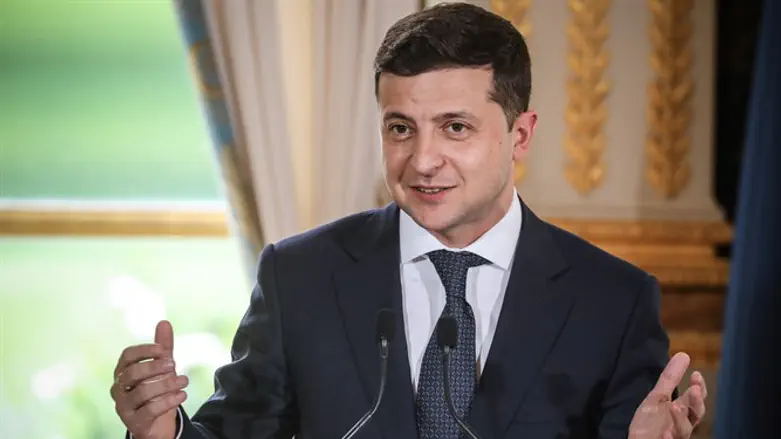
At an online meeting to discuss construction of the future Babyn Yar Holocaust Memorial Center in the city of Kyiv, Ukraine’s President Volodymyr Zelensky told the Center’s Supervisory Board that he supports its construction.
In September 1941, just days after the Nazis occupied Kyiv, around 34,000 of the city’s Jews were marched to the Babyn Yar ravine and shot dead over a two-day period. Later massacres were also carried out at the same site, killing victims of other minorities and nationalities too.
The Babyn Yar Holocaust Memorial Center will respectfully commemorate the victims of the tragedy and promote the humanization of mankind through preserving memory and study of the history of the Holocaust.
At yesterday’s meeting, President Zelensky stressed the importance of commemoration of the Holocaust victims in Ukraine and supported establishment of the Memorial.
President Vlodomyr Zelensky said, “The establishment of the memorial is extremely important for our country. Its history contains a lot of tragic pages. But we must bear them in minds and tell the coming generations about them. Such moments should stay in the history of Ukraine. They are in our talks, in our memory, in books. It would be very good if this project were brought into life and we built history together with you.”
President Zelensky also emphasized the importance of remembering the Ukrainian ‘Righteous Among the Nations,’ who saved Jews in the Holocaust.
The meeting participants agreed to form a working committee, headed by Andrii Yermak - Head of the Presidential Administration. The committee with coordinate regarding the framework of the Memorial’s establishment as well as to prepare for the 80th anniversary of the Babyn Yar tragedy.
The Head of the Supervisory Board, Natan Sharansky pointed out that the history of Babyn Yar is not only of importance for Jewish people, as it is also the site where other nationalities perished, in particular, Ukrainian, Belarus and Polish people.
Natan Sharansky said, “We have a common goal – to fight for the freedom and democracy of our peoples. This initiative is not just a monument, that is going to be a critical memorial, with the museum, a research center, contributing to raising the degree of tolerance in the society and playing a global role in Ukraine’s positioning in the world as well as its international recognition. Such institutions throughout the world are established in partnership with the state and supported by its key officials.”
President of the World Jewish Congress Ronald Lauder stressed that the future memorial must give visitors a clear answer to the question of what is anti-Semitism. He added that the project must be international and must draw attention of the whole world to the history of Ukraine.
Ronald Lauder said, “This is the third generation that knows about the Holocaust. But while almost everybody knows about Auschwitz, the history of Babyn Yar is almost unknown to young people. I want people to visit Kyiv in order to see the Babyn Yar Memorial, to understand what happened here. We have a chance now to do something fantastic. The more people that know what happened at Babyn Yar, the better off the world will be.”
The former-President of Poland (1995–2005) Aleksander Kwasniewski added that the project will considerably affect the image of Ukraine. He said, “We want to seriously and emotionally speak about the events that occurred 80 years ago. And with this history we want to look and to understand how we should live in the future. The project will greatly affect the image of Ukraine and the way people will perceive contemporary Ukraine.”
The first President of Ukraine (1991-1994) Leonid Kravchuk, who has also joined the Supervisory Board, emphasized that the future Memorial will be objectively historically truthful and honest. “This Project is interesting, important, and highly comprehensive. It is part of history. Babyn Yar is a terrible tragedy and that’s why we have to create an unrivalled memory of it, to make the best project possible.”
The former-Minister of Foreign Affairs and Vice-Chancellor of Germany (1998-2005) Joschka Fischer, said “For my country, it’s very important not to forget and to contribute everything that we can towards memory of the Holocaust and this terrible crime.” He added that the main goal of the project is awareness-raising and reaching out to the young generation. He commented, “In this project we will deploy advanced technologies to preserve history.”
Another member of the Supervisory Board, Sviatoslav Vakarchuk said that construction of the complex will also ensure preservation of the history of Ukraine. He commented, “It is highly important to show that Ukraine is a part of the civilized world, that it respects its own memory and knows its history.”